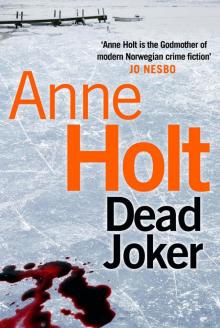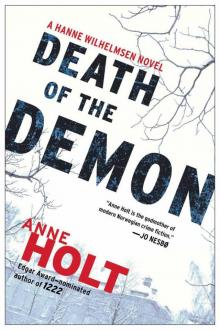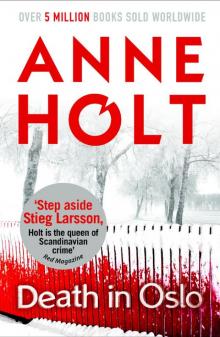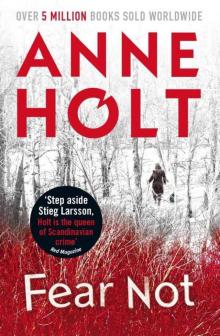Dead Joker Read online
Page 4
“I thought you’d become the champion of the disadvantaged and everyone’s friend,” Hanne said sharply. “What’s made you take on the case of his scornful highness Halvorsrud?”
“Friend of the family. Of my brother, to be more specific. Besides, you said it yourself: Halvorsrud’s in quite a weak position. What’s really wrong with you, Hanne?”
“Nothing.”
Hanne made a genuine effort to smile. She drew up the corners of her mouth, and tried to drag her eyes along with them. They filled up. She looked from side to side with her eyes wide open, aware her smile was about to morph into a grimace that would reveal something of what she would not speak about. Of what she could not speak about.
Karen Borg leaned across the desk, very carefully placing her hand on Hanne’s. Hanne pulled hers away, more as a reflex action than deliberate rejection.
“It’s nothing, really.” She tried to brush it aside as the tears began to roll.
Karen Borg had known Hanne Wilhelmsen since 1992. The early days of their friendship had been pretty dramatic: together they had been sent whirling into a murder case that had later turned into a political scandal of rare proportions. It had almost cost Karen Borg her life. Håkon Sand had rescued her from a burning cottage at the very last moment. When they had subsequently moved in together and had children, Hanne and Cecilie had become close friends of them both. Seven years had elapsed since.
“I’ve never seen you cry, Hanne.”
“I’m not actually crying,” Hanne Wilhelmsen corrected her as she wiped away her tears. “I’m just so worn out. Tired, somehow. All the time.”
Snow began to fall again. The enormous, frisky flakes melted as soon as they touched the windowpane, and Hanne was not sure whether it was because of them or her tears that the shapes in the park outside were merging into an indistinct image in shades of gray.
“I wish it was summer soon,” she whispered. “And warm. If only the weather was warmer, then everything would improve.”
Karen Borg did not reply. It occurred to her that even the most intense heatwave ever would not help Hanne Wilhelmsen. Nevertheless, she could not restrain herself from checking the time. The nursery would close in fifteen minutes. Hanne still didn’t say anything, and instead simply rocked to and fro in her chair, snapping her fingers. The feigned smile was still fixed like a mask on the lower part of her face, and tears were still running down her cheeks.
“We’ll talk again, then,” Karen Borg said, rising from her seat. “Tomorrow, ten o’clock.”
She felt uneasy as she hurried along the third-floor gallery, yellow zone. And she had no idea what she was going to cook for dinner.
7
The current had carried Ståle Salvesen’s mortal remains to the mouth of the fjord. Where the fjord met the sea, eddies had developed that toyed with the corpse for as long as they could summon the energy. When they’d grown tired of this, they’d forced it down to the seabed.
An old fishing boat, about fifteen meters long, lay at a depth of thirty-two meters. It had lain there since one rough winter’s night in 1952 and had long been a favorite haunt of amateur divers. The binnacle was gone. The solid oak wheel had been removed in the sixties by a young lad. There were no pots and pans left. All that remained was the shell of a boat with no glass in the windows of its pilot house.
Ståle Salvesen was no longer wearing his anorak. The water had wrenched it off him, and it now lethargically washed over the pebbles on the shore two kilometers farther north. However, he still had his boots on. They were firmly attached, as if by vacuum suction. When Ståle Salvesen’s right leg was dragged by the current through the pilot house, the leg of the boot got caught on a hook no one had taken the trouble to remove.
He resembled a four-armed starfish as he swayed in the cold March brine.
8
She had sensed it as soon as they walked up the garden path, the heels on her winter boots slightly too high for the coarse gravel, and Billy T. swearing as he buttoned his well-worn leather jacket against the bitterly cold snow.
“There’s something here,” Hanne Wilhelmsen said decisively to Billy T. “I know there’s something here.”
“Four guys have searched the house for three hours now,” he protested. “Zip. Zilch. Nothing. The most suspect thing we’ve found is a dishcloth that’s in need of bleaching, according to Karianne, and two copies of Cupido magazine under the boy’s bed.”
“Where are they actually?”
“Who?”
“The children. Where are they, and who’s looking after them?”
“Oh, the children. The eldest is on a school trip to Prague. The two younger ones are on a holiday in the sun with some aunt or other. Thank Christ for that, to some extent. It’s good they weren’t here last night. Everything’s under control. Clergymen and psychologists have been sent on package holidays here, there and everywhere, with the government footing the bill. We expect the kids will be brought home over the weekend.”
“Poor devils,” Hanne mumbled as she hunkered down in front of the fireplace in Public Prosecutor Halvorsrud’s living room. “You can interview them. Since you’ve got such a way with children.”
“Well, some children. They’re teenagers, you know.”
“It was actually two fuses that blew.”
Hanne stood up stiffly, aware that her left foot had gone to sleep. She stamped it softly on the floor as she gazed at a female police sergeant she could not recall having seen before.
“By themselves? I mean, in the ordinary run of things? Overload?”
“It’s difficult to say,” the Sergeant said with an eagerness that Hanne allowed herself to be annoyed by. “The fuse box is the modern kind. With circuit breakers. You know – the kind you just flick up and down. Of course, someone may have deliberately blacked out the ground floor.”
Evening was approaching. Hanne felt she was reaching the stage when it would be impossible to get to sleep without the help of pills. She had once been able to whiz through three days and nights with only an hour’s nap now and again. That had changed now too. One night without sleep, like last night, and her body called time only a few hours into the next day. She stifled a yawn.
“As far as the computer in the study is concerned,” the woman in the doorway continued, “there’s something … something odd, you might say.”
“Odd?” Hanne glanced at the Sergeant and repeated, “Odd. Okay, what’s so odd about it?”
“It’s completely blank,” the woman said, blushing.
“Which means?”
“Well, it means …” The woman squirmed. The burning in her cheeks did not let up. But neither did she. “It’s odd when a computer that looks fairly well used, with a grubby keyboard and fingerprints on the screen, doesn’t contain anything at all. Nothing. Not a single text file. The hard disk is absolutely empty of anything other than the software.”
“This is Holbeck, by the way,” Billy T. said, suddenly thinking it a good idea to introduce her. “She’s just arrived from Bergen Police District. Hanne Wilhelmsen!” His hand swept through the air in Hanne’s direction.
“Mmm,” Karianne Holbeck said with a smile. “Very good. Should I take the computer with me for a closer check?”
“Can you do that without damaging anything?”
Hanne Wilhelmsen’s knowledge of computers extended just as far as was necessary to write a document and store it.
“No problem,” Karianne assured her.
“She was in charge of IT in Bergen,” Billy T. whispered, loudly enough to ensure that Karianne could hear. “What’s more, she’s been on loan to the finance police at Økokrim precisely because she knows those machines inside out.”
Hanne nodded impassively, but checked herself and shot a smile in the direction of her new colleague. It was too late. Karianne Holbeck had already vanished to pack up a computer that showed every sign of having been well used but nevertheless contained nothing whatsoever.
“One more visit to the basement, and then we’ll call it a day.”
“Okay then,” Billy T. said, sulking as he trudged after Hanne into the hallway and down the stairs.
The basement smelled of washing powder and old rubber tires. A long corridor with four doors along one wall opened out into an orderly utility room. The washing machine and tumble drier bore the ultra-expensive Miele trademark. The dirty laundry, lying on a brown Formica worktop, was sorted into different bundles: whites, colors and delicates. The walls and floor were tiled, and the room appeared remarkably clean.
“There’s nothing here, at any rate,” Billy T. said, scratching his crotch. “Besides, I get a crick in my neck down here.”
Ignoring him, Hanne entered the adjoining room. If the laundry room was clean and tidy, this space was much more chaotic. It had clearly been a kind of hobby workshop – a carpentry bench and tools on the wall indicated as much. But it must have been a while since anyone had done any meaningful work in there. Two old bicycles were propped against the gable wall and three sets of worn car tires were stacked on sheets of brown cardboard, making it difficult to see the floor. In one corner there was a dusty demijohn surrounded by old clothes and boxes containing what looked like tattered paperbacks, a tricycle and the undercarriage of a baby’s pram from the eighties.
“This place doesn’t exactly look as if it’s been thoroughly searched,” Hanne Wilhelmsen said, landing a kick on a black plastic bag.
Seven beetles scurried off at top speed to find a new hiding place.
“I did tell them to search the basement one more time,” Billy T. said crossly. “But we’ve got people to do that, Hanne. It’s not necessary for a chief inspector to grub around in the dirt, for fuck’s sake.”
“You didn’t say that.”
“What?”
“You didn’t say that they should search the basement again. What’s that?”
Without waiting for an answer, she picked her way over to the tricycle. Leaning forward, she extracted something Billy T. could not see.
“And what have we here?” she asked as she straightened up. “A medicine cabinet. A very old medicine cabinet.”
“An open medicine cabinet?” Billy T. asked, half interested.
Hanne Wilhelmsen’s hands, encased in plastic gloves, very gently picked the simple lock using the pocketknife Billy T. had handed to her. Then she held the cabinet out to her colleague as if it were a treasure chest.
“You can have the honor,” she said. “Open it.”
Neither of them had expected anything at all. Although Hanne Wilhelmsen’s instinct had told her that something would reveal itself if they examined the Halvorsrud family villa in sufficiently minute detail, the contents of the shabby medicine cabinet still left her speechless for almost half a minute.
“Bloody hell,” Billy T. spluttered at last.
“You can say that again,” Hanne replied.
The cabinet, approximately half a meter high by perhaps forty centimeters wide, no longer contained any shelves. They had been removed to make room for fat bundles of banknotes wrapped in plastic, and what looked like fifteen to twenty computer disks. When Billy T. cautiously lifted the topmost wads of money, even more became visible.
“It’ll be quite interesting to hear what our friend in the back yard has to say about this,” Billy T. commented, lifting one of the bundles of notes to his nose, as though already keen to sniff out the answer.
“Billy T.!”
Karianne Holbeck stood breathless in the doorway.
“Look at this! I thought it would be a good idea to go through the trash …”
Hanne Wilhelmsen thrust her lower lip forward ever so slightly as she tossed her head in appreciation.
“… and this was lying there.”
Karianne Holbeck seemed unsure who should receive the sheet of paper. Billy T. helped solve her dilemma.
“An application for legal separation,” he said, reading further down the form, noting the smears of coffee grounds and something that had to be egg yolk.
“Signed by whom?” Hanne asked, directing her question to Karianne Holbeck. “I’ve spoken to Halvorsrud four times since last night, and he hasn’t said a word about any divorce plans.”
“By Doris Flo Halvorsrud. Only her. The column where the spouse’s name should appear is blank. But the worst thing is the date. Or the best thing, I suppose. It depends who you’re rooting for, I guess …”
Karianne smiled self-consciously and blushed again.
“Doris signed this paper yesterday. It must have been one of the last things she did. Before she … Before someone decapitated her.”
Hanne stood up straight, noting that Karianne Holbeck would benefit from losing five or six kilos.
“This is a lot to take in all at once,” she said with a placid expression. “It looks as though we ought to expedite tomorrow’s interview with Sigurd Halvorsrud. And I need to know what’s on these disks. Without delay.”
It was the afternoon of Friday March 5, and the hour was approaching half past five.
9
“Billy T. insisted,” Hanne Wilhelmsen said, intoxicated with sleep. “He wanted to do the interview himself. Everybody needs sleep, he said. Even Sigurd Halvorsrud. And I need a break, he told me.”
She had dozed off with her feet on the table. A glass of red wine had tipped over, waking her.
Cecilie Vibe got up to fetch a cloth. “Sensible,” she said absent-mindedly as she attempted to contain the damage to two books engulfed by the spreading pool of red liquid. “Put your feet down, then.”
Hanne Wilhelmsen stretched out on the settee, covering herself with a throw she pulled right up to her neck.
“Don’t let me fall asleep here,” she slurred.
Cecilie Vibe refilled the glass, switched off the TV and moved a chair so that she could keep an eye on the woman asleep on the settee. She did not enjoy the red wine. She had not enjoyed her dinner either. Nor had she for a long time now. Hanne had not even noticed that Cecilie had dropped four kilos in less than a month.
At some point, she would have to tell her. Two days had gone by. The doctor who had given her the results was an acquaintance from university days. Someone she had never really liked. It had been just as difficult to make eye contact with him then as it had been before. He had tugged his earlobe roughly and mumbled into his coffee cup. Cecilie had fixed her gaze on her colleague’s right ear, overwhelmed by the feeling that time was passing inordinately slowly.
When she left the hospital, the weather had not changed. The snow that barely an hour earlier had chased her in through the automatic doors of the oncology department cut through her just as sharply when she re-emerged. But this time she did not notice. A blob of chewing gum on the wet asphalt had completely captured her attention. It became a globe, a bauble, a ball. A tumor. Eventually, a porter hauling empty beds had chided her, urging her to get going. She had no idea where to go.
Cecilie Vibe had a malignant tumor the size of a tennis ball on her colon. The probability was that it had been there for some time, though it was too early to tell whether it had pushed its way through the intestinal wall and forced itself into other organs. Perhaps. Perhaps not.
She put down the empty wine glass and filled it with fresh, cool spring water from a bottle, watching as it took on a faint trace of color from the wine dregs. She swirled the pastel-pink water round and round as she tried to think about what they might do that summer.
Cecilie had not posed a single question to the man with the bright red earlobe. She had none, just then. Later, she had looked up all the databases she could access from her office. Then she had wept as she walked all the way home.
She should have told Hanne this evening.
Hanne knew nothing. Even that morning six weeks earlier, when Cecilie had discovered blood in her stools and acknowledged for the first time a cold dread at the thought of how listless and out of sorts she had felt for some time, Hanne had been d
istant and unobservant. Her alarm at the discovery on the toilet paper, her longing for it all to be a mistake – perhaps her period had got muddled and come early – had made Cecilie flush it away as quickly as possible and then brush her teeth with excessive vigor. There was nothing to talk about. Not then. It was definitely nothing. Just a lot of unnecessary fear that Hanne had not noticed, even though it encased Cecilie like a shell as she stood in the bathroom, naked and completely invisible to Hanne; she had not even said goodbye when she left.
And then it turned out that there was something, after all.
Hanne had been ready to drop when she got home at quarter to eight. For once she had babbled like a brook, maybe in order to stay awake long enough to eat something. Hanne chattered away about a headless corpse, a man who had jumped into the sea and a public prosecutor who needed to prepare himself to spend years behind bars. About motherless teenagers with their father in jail, about Billy T. becoming ever more unbearable in his obsession with his forthcoming wedding. About the new office Hanne simply could not get accustomed to, and about the new exhaust for her Harley that had still not arrived.

 A Grave for Two
A Grave for Two Dead Joker
Dead Joker Death of the Demon: A Hanne Wilhelmsen Novel
Death of the Demon: A Hanne Wilhelmsen Novel Punishment aka What Is Mine
Punishment aka What Is Mine Beyond the Truth
Beyond the Truth Death in Oslo
Death in Oslo The Blind Goddess
The Blind Goddess What Never Happens
What Never Happens 1222
1222 In Dust and Ashes
In Dust and Ashes Odd Numbers
Odd Numbers What is Mine
What is Mine What Dark Clouds Hide
What Dark Clouds Hide Blessed Are Those Who Thirst
Blessed Are Those Who Thirst Fear Not
Fear Not No Echo
No Echo Hanne Wilhelmsen - 01 - The Blind Goddess
Hanne Wilhelmsen - 01 - The Blind Goddess